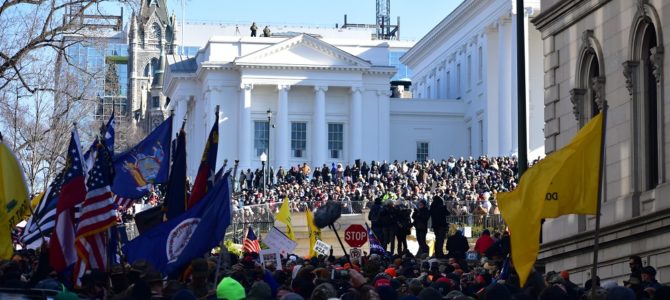
The talk is getting more serious. A number of people in the rural areas of Virginia, especially in the western part of the state, are openly exploring the idea of urging their county governments to leave the state of Virginia and join West Virginia.
Similar complaints are being raised with increasing seriousness in rural areas of Oregon and a handful of other states. I will address this issue from the perspective of my home state, Virginia.
The U.S. Constitution contains no meaningful barrier to this action if the people and local governments of the affected areas of Virginia and West Virginia earnestly desire it. Article IV Section 3 requires the consent of a state legislature if a new state is to be formed out of an existing state. If a new state is to be formed out of two existing states, then both of the affected state legislatures must consent. Congress must also consent to either of these scenarios.
But nothing in the Constitution prohibits one or more counties of an existing state from leaving one state and joining another. Neither the consent of the original state nor the consent of Congress is required.
If the consent of Congress is thought to control this kind of transfer in general, it appears that Congress has already consented in the case of West Virginia. Article VI, Section 11 of the West Virginia Constitution permits the annexation of “additional territory” upon the approval of the legislature and a ratifying vote of the people of West Virginia. This provision was a part of West Virginia’s original Constitution, which Congress approved.
I am not ready to advocate this transfer of Virginia counties to West Virginia, although I am very sympathetic to the underlying dissatisfaction that has led good people to consider this dramatic alternative.
Upset Virginians Have Very Good Reasons to Be
The U.S. Supreme Court has issued a far-reaching series of opinions that have led to this state of affairs. In the 1960s, the Warren Court repeatedly invalidated state legislative apportionment plans based on the principle of “one person one vote.” These cases required every legislative body at the state level to be based exclusively on equal population.
Some of the laws invalidated in these cases were truly bizarre and, consequently, utterly unjust. Tennessee had not reapportioned its legislature in decades and the resulting system was simply an indefensible crazy-quilt of unequally sized legislative districts.
Laws in states with a system that paralleled the U.S. Congress were also invalidated. South Carolina, for example, required its House to be equally apportioned by population, while each county had one senator.
Requiring both houses to be apportioned strictly on population has led to a situation where rural areas of states often view cities as possessing uncontrolled power. Legislatures elected in this manner are unconcerned with rural citizens’ views, desires, and votes. For example, Virginia gun owners successfully lobbied the vast majority of rural and suburban county governments to pass measures designed to mitigate proposed state legislation imposing stringent gun control.
When a legislature is balanced with one house based on population and one house based on other factors including geography, this prohibits either the majority urban areas or the smaller rural areas from dominating state policy. To get anything passed, there must be a balance between the two interests. Majority rule and minority rights are both protected in such a system—just like in the U.S. Senate.
Majorities Stomp on Minorities’ Rights
New stringent, statewide gun control laws proposed by the incoming Democratic majority have been the key catalyst for the idea of counties moving from Virginia to West Virginia. Second Amendment advocates convinced the vast majority of Virginia county governments to adopt pro-Second Amendment measures designed to resist these proposed new laws. And then tens of thousands of gun owners rallied in Richmond in support of Second Amendment rights.
The Democratic-controlled legislature ignored both the marching citizens and a great number of county governments. The reason? The localities that were pro-Second Amendment were not the urban centers with the biggest blocs of voters. Since the strong majority of Democrat legislators come from urban areas, they take the cold, but realistic approach that they don’t need anything other than the urban centers to be in control.
It’s not just Virginia. Rural and other non-urban voters are seeing themselves more and more as a powerless and oppressed minority in many states.
The biggest threat to non-urban voters is the powerful, yet dubious, effort to effectively require a national popular vote for president to supplant the Electoral College. An interstate compact, currently adopted by 15 states and the District of Columbia—all controlled by the Democratic Party—will guarantee that their electoral votes will go to the candidate winning the national popular vote. States with 74 more electoral votes are needed to trigger the compact, since it purports to become effective when the electoral vote of participating states comprises a majority of the electoral votes.
This measure will require the consent of Congress, which seems likely if Democrats control both chambers. It must also survive a near-certain legal challenge. But it is clearly a measure that permits major metropolitan areas to dominate presidential elections and make rural and small- to mid-sized cities as irrelevant as gun owners are in the Democratic-controlled Virginia legislature.
The City Versus Country Dynamic Is Growing
In 2016, according to the Associated Press, Hillary Clinton won a majority in 487 counties while Donald Trump won 2,626 counties. More importantly, Trump won 30 states while Clinton won 20 states. But, of course, Clinton won the popular vote by more than 3 million—primarily because her margin of victory in big cities was so dominant.
Under this proposed compact, the voters in 30 states and 2,626 counties would simply be overwhelmed by their more populous neighbors in 20 states and 487 counties.
The number of voices raised against the composition of the Senate also seems to be growing daily. We are regularly treated to statistics from major news organizations that show that the senators representing a minority of voters can defeat something the far-left wants.
Jackson Kernion, an instructor from University of California at Berkeley, recently revealed the radical extent of this anti-rural mindset. “I unironically embrace the bashing of rural Americans. They, as a group, are bad people who have made bad life decisions. Some, I assume are good people. But this nostalgia for some imagined pastoral way of life is stupid and we should shame people who aren’t pro-city.”
Kernion made it clear that he believed this anti-rural stance should be applied in law and policy—health care, roads, and more.
Many Americans are familiar with the Hunger Games movies. People in Capital City lorded their power over rural people in a manner that resulted in economic deprivation and deadly terror. Kernion embraces economic deprivation for rural dwellers and, for now, only advocates shaming the people in the “districts.” But the difference between his view and the Hunger Games is a difference in degree, not kind.
America was founded as a republic with several features included to ensure that the majority could not readily trample the rights of minorities. The Bill of Rights is the most famous example.
But the Electoral College, the composition of the U.S. Senate, and the historic ability of states to apportion state legislatures in a manner that allocates one house based on population and the other based on a formula that gives more weight to the diversity of rural and city living were also incredibly important aspects of ensuring that America remains a republic—where minorities are not oppressed by their skin color, religion, or where they choose to live.
If this effort to consolidate big city dominance continues, don’t be surprised when rural people attempt to leave their urban-dominated political environments and seek to re-attach themselves to a more balanced state nearby.







